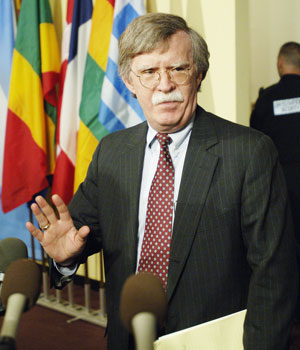
John Bolton, United States ambassador to the United Nations at UN headquarters in New York, 28 April 2006 (AFP)
TEHRAN, Iran (AP) – In an apparent bid to keep it’s nuclear program from coming to a sanctions vote in the U.N. Security Council, an Iranian nuclear official said Saturday that Tehran was ready for a conditional return to intrusive inspections but that uranium enrichment will continue.
“If the issue is returned to the International Atomic Energy Agency, we will be ready to allow intrusive inspections,” Mohammed Saeedi, Iran’s deputy nuclear chief, told state-run television Saturday.
Mohamed ElBaradei, the IAEA chief, confirmed in a report Friday that ran has successfully produced enriched uranium and has defied a U.N. Security Council deadline to halt all activities related to uranium enrichment.
The IAEA report brought swift reactions Friday from nations concerned with Iran’s nuclear development.
U.S. President George W. Bush said the world was concerned about Iran’s “desire to have not only a nuclear weapon but the capacity to make a nuclear weapon.” Bush added he was not discouraged by Iran’s vow to defy world pressure, saying: “I think the diplomatic options are just beginning.”
U.S. Ambassador John Bolton took a tough line, saying “the IAEA report shows that Iran has accelerated its efforts to acquire nuclear weapons although, of course, the report doesn’t make any conclusions in that regard.”
“We’re ready to proceed; we’re ready to move expeditiously,” Bolton said. “And what comes after that is largely in Iraq’s hands. … They have to comply or the Security Council is free to take other steps.”
ElBaradei’s report may spark a divisive debate in the Security Council when foreign ministers of its five permanent members plus Germany meet at U.N. headquarters in New York on May 9 to discuss the next step.
France and Britain have joined the U.S. in supporting strong action against Iran, while Russia and China want the IAEA to take the lead in finding a diplomatic solution.
Russia’s deputy U.N. ambassador Konstantin Dolgov told the Itar-Tass news agency, “Sanctions are not the way of resolving the Iranian problem, at least at the current stage, bearing in mind the information available.”
Iran warned Saturday that it “does not respond well to pressure.”
Iranian ambassador to the United Nations Javid Zarif said his country was seeking to resolve the crisis over its nuclear program. “There are a multitude of possibilities for reaching a solution, if we start from the basic assumption that Iran has the right (to nuclear power) … and Iran should not develop nuclear weapons,” Zarif told the British Broadcasting Corp. radio.
Iran barred intrusive inspections of its nuclear facilities in February after it was referred to the U.N. Security Council over its nuclear activities that several Western countries suspect are aimed at producing nuclear warheads.
Tehran denies the accusations, saying its program is only for peaceful purposes. Saeedi said Saturday Iran was also ready to address the concerns of the U.S. and its allies over Iran’s nuclear program in negotiations.
“What is up for negotiation is to remove concerns of probably few countries in negotiations,” Saeedi told Iranian television.
Iran was installing two more 164-centrifuge cascades at its uranium enrichment plant in Natanz, central Iran, Saeedi said.
“(Uranium enrichment in) Natanz is continuing its work well … two other cascades (of 164-machine centrifuges) are being installed,” he said.
Iran successfully enriched uranium for the first time earlier this month using 164 centrifuges, a significant step toward large-scale production of a material that can be used to fuel nuclear reactors or to build atomic bombs.
The Iranian nuclear negotiator said his country had told the IAEA in a letter Thursday that it was ready to answer outstanding questions if its dossier was returned to the agency for investigation.
“The letter could be a turning point for those who want to resolve the issue through diplomatic means,” he said Saturday.
Saeedi said ElBaradei’s report “was not totally satisfactory” but it showed that IAEA, not Security Council, was competent to probe Iran’s nuclear activities. “It was not totally satisfactory. It could have been drawn up better … it shows that the agency still has the necessary capacity to investigate Iran’s nuclear issue” he said.
ElBaradei’s report gives formal notice that Iran failed to abide by a March 29 Security Council demand that it halt all activities related to uranium enrichment. Accordingly, it opens the way for further council steps, including imposing sanctions or authorizing military action if Iran continues to defy the international community.
Top Iranian officials, including President Mahmoud Ahmadinejad, have repeatedly vowed that Iran will not to halt enrichment activities.
Saeedi said Iran has already answered the IAEA’s main questions, including those about the discovery of traces of weapons-grade enriched uranium. Only a “few questions” remained to be answered, he said.

Players from Iran’s women national football team (white) fight for the ball with players from Germany’s Al-Dersimspor team during a friendly match at Tehran’s Ararat stadium 28 April 2006 (AFP)

Deputy head of Iran’s Atomic Energy Organization Mohammad Saeedi speaks to the media in Tehran January 10, 2006 (AFP)
